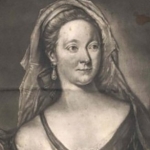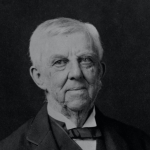or, The Wary Physician
A doctor, of great skill and fame,
Paulo Purganti was his name,
Had a good, comely, virtuous wife;
No woman led a better life:
She to intrigue was ev'n hard hearted:
She chuckled when a bawd was carted;
And thought the nation ne'er would thrive,
Till all the whores were burnt alive.
On married men, that dared be bad,
She thought no mercy should be had;
They should be hanged, or starved, or flayed,
Or served like Romish priests in Swede.
In short, all lewdness she defied;
And stiff was her parochial pride.
Yet, in an honest way, the dame
Was a great lover of that same;
And could from Scripture take her cue,
That husbands should give wives their due.
Her prudence did so justly steer
Between the gay and the severe,
That, if in some regards, she chose
To curb poor Paulo in too close;
In others, she relaxed again,
And governed with a looser rein.
Thus, though she strictly did confine
The doctor from excess of wine;
With oysters, eggs, and vermicelli,
She let him almost burst his belly:
Thus, drying coffee was denied;
But chocolate that want supplied;
And for tobacco—who could bear it?
Filthy concomitant of claret!—
(Blest resolution!) one might see
Eringo roots, and Bohea tea.
She often stroked the doctor's band,
And stroked his beard, and kissed his hand,
Kindly complained, that after noon
He went to pore on books too soon:
She held it wholesomer by much,
To rest a little on the couch;
About his waist in bed-a-nights
She clung on close—for fear of sprites.
The doctor understood the call,
But had not always wherewithal.
The Lion's skin too short, you know,
(As Plutarch'sMorals finely show)
Was lengthened by the Fox's tail;
And Art supplies, where Strength may fail.
Unwilling then in arms to meet
The enemy he could not beat,
He strove to lengthen the campaign,
And save his forces by chicane.
Fabius, the Roman chief, who thus
By fair retreat grew Maximus,
Shows us, that all warrior can do,
With force superior iscunctando.
One day, then, as the foe drew near,
Our Don, who knew this tittle-tattle
Did, sure as trumpet, call to battle,
Thought it extremelyà propos,
To ward against the coming blow:
To ward: But how? ay, there's the question:
Fierce the assault, unarmed the bastion.
The doctor feigned a strange surprise;
He felt her pulse; he viewed her eyes;
That was too fast; these rolled too quick:
She was, he said, or would be sick:
He judged it absolutely good,
That she should purge, and cleanse her blood.
Spa-waters to that end were got:
If they passed easily or not,
What matters it? the lady's fever
Continued as violent as ever.
For a distemper of this kind
(Blackmore and Hans are of my mind)
If once it youthful blood infects,
And chiefly of the female sex,
Is scarce removed by pill or potion;
Whate'er may be our doctor's notion.
One luckless night then, as in bed
The doctor and the dame were laid,
Again this cruel fever came:
High pulse, short breath, and blood in flame.
What measures shall poor Paulo keep
With Madam in this piteous taking?
She, like Macbeth, has murdered sleep,
And won't allow him rest, though waking.
Sad state of matters! when we dare
Nor Livy nor Comines have shown,
What in this juncture may be done.
Grotius might own, that Paulo's case is
Harder, than any which he places
Amongst hisBelli, and hisPacis.
He strove, alas, but strove in vain,
By dint of logic to maintain
That all the sex was born to grieve,
Down to her Ladyship from Eve.
He ranged his tropes, and preached up patience;
Backed his opinion with quotations,
Divines and moralists; and run on
Quite through from Seneca to Bunyan.
As much in vain he bid her try
To fold her arms, to close her eye;
Telling her, rest would do her good,
If any thing in nature could:
So held the Greeks quite down from Galen,
Masters and princes of the calling:
So all our modern friends maintain,
(Though no great Greeks) in Warwick-lane.
Reduce, my Muse, the wand'ring song:
A tale should never be too long.
The more he talked, the more she burned,
And sighed, and tossed, and groaned, and turned:
At last, I wish, said she, my dear—
(And whispered something in his ear).
You wish! wish on, the doctor cries:
Lord! when will womankind be wise?
What! in your waters; are you mad?
Why, poison is not half so bad.
I'll do—but I give you warning;
You'll die before tomorrow morning.—
'Tis kind, my dear, what you advise,
The lady with a sign replies:
But life, you know, at best is pain:
And death is what we should disdain.
So do it therefore, and adieu:
For I will die for love of you.—
Let wanton wives by death be scared:
But, to my comfort, I'm prepared.





















Comment form: